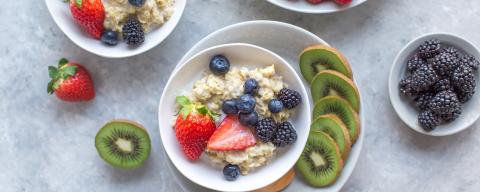Feed the Friends in Your Gut Microbiome
Every food that you eat impacts your health in many ways. Within just 24 hours, the foods we eat can change the bacterial make up in our stomachs, small, and large intestines, or our gut. There are many types of bacteria that make up an environment called the microbiome. Like our fingerprints, the bacteria in our bodies are unique. Each gut microbiome will be populated with different bacteria. This is influenced by several factors, one including the types of foods you eat. Our gut bacteria thrive off specific meals. Some foods will keep them, and ultimately you, healthy while other foods have been linked to certain diseases like inflammatory bowel disease (IBD), obesity, diabetes mellitus, and cardiovascular disease. The main job of your gut microbiome is to break down food that is hard for us to digest on our own and make it into new vitamins and fats for our bodies to use. When we do not have enough good bacteria populating our gut communities, bad bacteria can increase your chance of disease. Who would not want that to be as healthy as possible? Here are a couple of foods you can start eating or minimize to keep your bacterial friends happy and healthy.
Bacterial Buddies
Common buzz words around gut health include probiotics and prebiotics. These are both useful to the bacteria in our gut but are very different.
Probiotics
Probiotics are living microorganisms. The main role of probiotics is to populate and help the bacteria community. Consuming these little guys has shown to have positive effects on our bodies like helping your immunity, making vitamins, and preventing certain diseases, like cancer. Like the bacteria in our gut, there is nothing to worry about when starting to include them in your diet. Some good food sources of these bacteria buddies are yogurt, kefir, sauerkraut and kombucha.
Prebiotics
Not everything we eat is easily digested. Prebiotics are food that have ingredients that are difficult or impossible to digest. The job of these bacteria buddies is to start and continue the growth of our gut bacteria. They can also strengthen the environment of the bacteria, help your immunity, and produce good fats for your body. A couple good sources of prebiotics include soybeans, whole grains, and oats.
Spotting Bacterial Bullies
Proteins and Fats
There are certain nutrients in foods that do not get along with out gut microbiome. When you consume a diet high in animal protein and fat and low in fiber, research has shown to reduce the number of good bacteria throughout our gut. Not all fats are bad for our gut communities. The fats commonly found in cooking oils, fish, nuts, and avocado are helpful to our gut. A diet including a variety of foods like fruits, vegetables, and healthy fat has been shown to keep your gut healthy and help lessen your chances of cardiovascular disease.
Restrictive Diets
One diet widely followed that is not beneficial to the gut microbiome is a gluten free diet. Like dairy, some guts are not able to break down gluten. Those avoiding gluten not due to intolerance or disease should include gluten in their diet to improve their gut health. Studies show following a gluten free diet can reduce the good bacteria while boosting the bad bacteria throughout our guts. Research also showed similar results to those following a vegetarian or vegan diet. If following these diets, it is important to eat foods containing probiotics and prebiotics. These foods could include sauerkraut, kimchi, kombucha, chickpeas, lentils, beans, bananas, grapefruit, and bran or barely based cereals. Consuming a diet that allows you to eat a variety of nutrients from many different food sources shows to be the most beneficial to your gut health.
References
Gomaa EZ. (2020). Human gut microbiota/microbiome in health and disease: a review. Antonie van Leeuwenhoek 113(12), 2019-2040 https://doi.org/10.1007/s10482-020-01474-7
Singh RK, Cheng HW, Di Y, Lee, KM, Ucmak D, Wong K, Abrouk M, Farahnik B, Nakamura M, Zhu TH, Liao W. (2017). Influence of diet on the gut microbiome and implications for human health. J Transl Med 15(73), 10.1186/s12967-017-1175-y
Valdes AM. (2018). Role of the gut microbiome in nutrition and health. BJM 361, 10.1136/bmj.k2179
Parekh PJ, Balart LA, Johnson DA. (2015). The Influence of the Gut Microbiome on Obesity, Metabolic Syndrome and Gastrointestinal Disease. Clin Tansl Gastroenterol 6(9), https://doi.org/10.1038%2Fctg.2015.16
Leonard J. (2018, September 21). The 10 best probiotics for vegans https://www.medicalnewstoday.com/articles/323139#the-best-vegan-probiotics
Cadman B, (2018, October 1). What prebiotic foods should people eat? https://www.medicalnewstoday.com/articles/323214
Check Out Our New Health & Well-Being Page
Our specialists help create healthy people and healthy places in New Hampshire.
Featured LINK
Mental Health Resources for New Hampshire - a printable county-specific guide to help New Hampshire residents find local, state, and national mental health resources.

